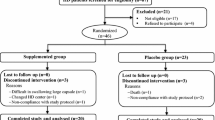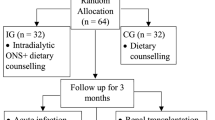Abstract
Objective
The current study was carried out to assess the effects of omega-3 fatty acid and alpha-tocopherol co-supplementation on malnutrition–inflammation score (MIS), biomarkers of inflammation and oxidative stress in chronic hemodialysis (HD) patients.
Methods
In a randomized double-blind placebo-controlled clinical trial, 120 patients with chronic HD were included. Patients were randomly allocated into four groups to receive: (1) 1250 mg/day omega-3 fatty acid containing 600 mg EPA and 300 mg DHA + alpha-tocopherol placebo (n = 30); (2) 400 IU/day alpha-tocopherol + omega-3 fatty acids placebo (n = 30); (3) 1250 mg omega-3 fatty acids/day + 400 IU/day alpha-tocopherol (n = 30); and (4) omega-3 fatty acids placebo + alpha-tocopherol placebo (n = 30) for 12 weeks.
Results
After 12 weeks of intervention, all three groups of alpha-tocopherol only, individual omega-3 fatty acids, and combined omega-3 fatty acids and alpha-tocopherol experienced a significant improvements in MIS compared with the placebo group; however, improvements were much greater in the individual omega-3 fats (−1.4 ± 1.4) and combined omega-3 fats and alpha-tocopherol (−1.1 ± 2.3) groups compared with alpha-tocopherol group alone (−0.5 ± 1.7, P = 0.004). Furthermore, both individual and combined intervention with omega-3 fats and alpha-tocopherol led to a significant increase in plasma nitric oxide (NO) (combined group: +17.6 ± 29.3; alpha-tocopherol: +43.1 ± 36.3; omega-3 fats: +31.0 ± 40.0; and placebo: −0.5 ± 18.5 µmol/L, respectively, P < 0.001) and total antioxidant capacity (TAC) (+64.9 ± 113.6, +53.0 ± 144.6, +57.6 ± 157.8 and −69.9 ± 215.1 mmol/L, respectively, P = 0.004) levels.
Conclusion
Overall, omega-3 fatty acids and alpha-tocopherol co-supplementation for 12 weeks among HD patients improved MIS, plasma NO and TAC levels. Future studies with longer duration of the intervention are needed to confirm the validity of our findings.
Clinical registration
www.irct.ir as IRCT201410245623N28.
Similar content being viewed by others
Change history
30 April 2020
Concerns have been raised about integrity of the clinical trial reported in 10.1007/s11255-016-1399-4. There is an ongoing investigation by the Iranian National Committee for Ethics in Biomedical Researches. Further editorial action will be taken as appropriate once the investigation into the concerns is complete and all parties have been given an opportunity to respond in full.
References
Stockler-Pinto MB, Mafra D, Moraes C et al (2014) Brazil nut (Bertholletia excelsa, H.B.K.) improves oxidative stress and inflammation biomarkers in hemodialysis patients. Biol Trace Elem Res 158:105–112
Sohrabi Z, Eftekhari MH, Eskandari MH, Rezaeianzadeh A, Sagheb MM (2015) Malnutrition-inflammation score and quality of life in hemodialysis patients: is there any correlation? Nephrourol Mon 7:e27445. doi:10.5812/numonthly.7(3)2015.27445
Spittle MA, Hoenich NA, Handelman GJ, Adhikarla R, Homel P, Levin NW (2001) Oxidative stress and inflammation in hemodialysis patients. Am J Kidney Dis 38:1408–1413
Pupim LB, Himmelfarb J, McMonagle E, Shyr Y, Ikizler TA (2004) Influence of initiation of maintenance hemodialysis on biomarkers of inflammation and oxidative stress. Kidney Int 65:2371–2379
Boaz M, Matas Z, Biro A et al (1999) Comparison of hemostatic factors and serum malondialdehyde as predictive factors for cardiovascular disease in hemodialysis patients. Am J Kidney Dis 34:438–444
Taheri S, Keyvandarian N, Moeinzadeh F, Mortazavi M, Naini AE (2014) The effect of omega-3 fatty acid supplementation on oxidative stress in continuous ambulatory peritoneal dialysis patients. Adv Biomed Res 3:143. doi:10.4103/2277-9175
Hodkova M, Dusilova-Sulkova S, Kalousova M et al (2006) Influence of oral vitamin E therapy on micro-inflammation and cardiovascular disease markers in chronic hemodialysis patients. Ren Fail 28:395–399
Tayyebi-Khosroshahi H, Houshyar J, Tabrizi A, Vatankhah AM, Razzagi Zonouz N, Dehghan-Hesari R (2010) Effect of omega-3 fatty acid on oxidative stress in patients on hemodialysis. Iran J Kidney Dis 4:322–326
Giray B, Kan E, Bali M, Hincal F, Basaran N (2003) The effect of vitamin E supplementation on antioxidant enzyme activities and lipid peroxidation levels in hemodialysis patients. Clin Chim Acta 338:91–98
Himmelfarb J, Phinney S, Ikizler TA, Kane J, McMonagle E, Miller G (2007) Gamma-tocopherol and docosahexaenoic acid decrease inflammation in dialysis patients. J Ren Nutr 17:296–304
Hassan Eftekhari M, Aliasghari F, Babaei-Beigi MA, Hasanzadeh J (2013) Effect of conjugated linoleic acid and omega-3 fatty acid supplementation on inflammatory and oxidative stress markers in atherosclerotic patients. ARYA Atheroscler 9:311–318
Rossi A, Kapahi P, Natoli G et al (2000) Anti-inflammatory cyclopentenone prostaglandins are direct inhibitors of IkappaB kinase. Nature 403:103–108
Wu D, Han SN, Meydani M, Meydani SN (2004) Effect of concomitant consumption of fish oil and vitamin E on production of inflammatory cytokines in healthy elderly humans. Ann N Y Acad Sci 1031:422–424
Ghanei E, Zeinali J, Borghei M, Homayouni M (2012) Efficacy of omega-3 fatty acids supplementation in treatment of uremic pruritus in hemodialysis patients: a double-blind randomized controlled trial. Iran Red Crescent Med J 14:515–522
Ahmadi A, Mazooji N, Roozbeh J, Mazloom Z, Hasanzade J (2013) Effect of alpha-lipoic acid and vitamin E supplementation on oxidative stress, inflammation, and malnutrition in hemodialysis patients. Iran J Kidney Dis 7:461–467
Tatsch E, Bochi GV, Pereira Rda S et al (2011) A simple and inexpensive automated technique for measurement of serum nitrite/nitrate. Clin Biochem 44:348–350
Benzie IF, Strain JJ (1996) The ferric reducing ability of plasma (FRAP) as a measure of “antioxidant power”: the FRAP assay. Anal Biochem 239:70–76
Beutler E, Gelbart T (1985) Plasma glutathione in health and in patients with malignant disease. J Lab Clin Med 105:581–584
Janero DR (1990) Malondialdehyde and thiobarbituric acid-reactivity as diagnostic indices of lipid peroxidation and peroxidative tissue injury. Free Radic Biol Med 9:515–540
Kalantar-Zadeh K, Kopple JD, Block G, Humphreys MH (2001) A malnutrition-inflammation score is correlated with morbidity and mortality in maintenance hemodialysis patients. Am J Kidney Dis 38:1251–1263
Jamilian M, Samimi M, Kolahdooz F, Khalaji F, Razavi M, Asemi Z (2016) Omega-3 fatty acid supplementation affects pregnancy outcomes in gestational diabetes: a randomized, double-blind, placebo-controlled trial. J Matern Fetal Neonatal Med 29:669–675
Kalantar-Zadeh K (2005) Recent advances in understanding the malnutrition-inflammation-cachexia syndrome in chronic kidney disease patients: what is next? Semin Dial 18:365–369
Del Vecchio L, Locatelli F, Carini M (2011) What we know about oxidative stress in patients with chronic kidney disease on dialysis–clinical effects, potential treatment, and prevention. Semin Dial 24:56–64
McVeigh GE, Brennan GM, Johnston GD et al (1993) Dietary fish oil augments nitric oxide production or release in patients with type 2 (non-insulin-dependent) diabetes mellitus. Diabetologia 36:33–38
Desideri G, Marinucci MC, Tomassoni G, Masci PG, Santucci A, Ferri C (2002) Vitamin E supplementation reduces plasma vascular cell adhesion molecule-1 and von Willebrand factor levels and increases nitric oxide concentrations in hypercholesterolemic patients. J Clin Endocrinol Metab 87:2940–2945
Tuncyurek P, Sari M, Firat O et al (2006) Does pharmaconutrition with l-arginine and/or alpha-tocopherol improve the gut barrier in bile duct ligated rats? Eur Surg Res 38:4–10
Fox PL, DiCorleto PE (1988) Fish oils inhibit endothelial cell production of platelet-derived growth factor-like protein. Science 241:453–456
Al-Gayyar MM, Shams ME, Barakat EA (2012) Fish oil improves lipid metabolism and ameliorates inflammation in patients with metabolic syndrome: impact of nonalcoholic fatty liver disease. Pharm Biol 50:297–303
Gupta S, Sharma TK, Kaushik GG, Shekhawat VP (2011) Vitamin E supplementation may ameliorate oxidative stress in type 1 diabetes mellitus patients. Clin Lab 57:379–386
Antoniadi G, Eleftheriadis T, Liakopoulos V et al (2008) Effect of one-year oral alpha-tocopherol administration on the antioxidant defense system in hemodialysis patients. Ther Apher Dial 12:237–242
Lonn E, Bosch J, Yusuf S et al (2005) Effects of long-term vitamin E supplementation on cardiovascular events and cancer: a randomized controlled trial. JAMA 293:1338–1347
Lonn E, Yusuf S, Hoogwerf B et al (2002) Effects of vitamin E on cardiovascular and microvascular outcomes in high-risk patients with diabetes: results of the HOPE study and MICRO-HOPE substudy. Diabetes Care 25:1919–1927
Bowry VW, Ingold KU, Stocker R (1992) Vitamin E in human low-density lipoprotein. When and how this antioxidant becomes a pro-oxidant. Biochem J 288 (Pt 2): 341-344
Brown BG, Zhao XQ, Chait A et al (2001) Simvastatin and niacin, antioxidant vitamins, or the combination for the prevention of coronary disease. N Engl J Med 345:1583–1592
Yeung CK, Billings FTT, Claessens AJ et al (2015) Coenzyme Q10 dose-escalation study in hemodialysis patients: safety, tolerability, and effect on oxidative stress. BMC Nephrol 16:183. doi:10.1186/s12882-015-0178-2
Taccone-Gallucci M, Noce A, Bertucci P et al (2010) Chronic treatment with statins increases the availability of selenium in the antioxidant defence systems of hemodialysis patients. J Trace Elem Med Biol 24:27–30
Firuzi O, Shakibazad N, Amoozgar H et al (2013) Effects of omega-3 polyunsaturated fatty acids on heart function and oxidative stress biomarkers in pediatric patients with dilated cardiomyopathy. Int Cardiovasc Res J 7:8–14
Capo X, Martorell M, Sureda A, Llompart I, Tur JA, Pons A (2015) Diet supplementation with DHA-enriched food in football players during training season enhances the mitochondrial antioxidant capabilities in blood mononuclear cells. Eur J Nutr 54:35–49
Acknowledgment
The present study was supported by a grant from the Vice-chancellor for Research, KUMS, and Iran.
Author contributions
ZA and AE contributed in conception, data collection and manuscript drafting. AS, HSh, NM and MB contributed in conception, data collection and manuscript drafting.
Author information
Authors and Affiliations
Corresponding author
Ethics declarations
Conflict of interest
None.
Rights and permissions
About this article
Cite this article
Asemi, Z., Soleimani, A., Shakeri, H. et al. Effects of omega-3 fatty acid plus alpha-tocopherol supplementation on malnutrition–inflammation score, biomarkers of inflammation and oxidative stress in chronic hemodialysis patients. Int Urol Nephrol 48, 1887–1895 (2016). https://doi.org/10.1007/s11255-016-1399-4
Received:
Accepted:
Published:
Issue Date:
DOI: https://doi.org/10.1007/s11255-016-1399-4




